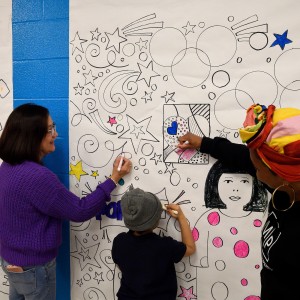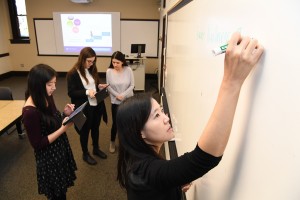The curriculum for academically advanced pre-college learners is part of an overarching antiracism initiative launched by the center.
The first meeting of the Johns Hopkins Center for Talented Youth's new Color of Law course this summer began with some house rules:
- "We need to assume we all have good intentions."
- "We should listen to understand each other—not just to argue our point."
- "Give praise if we can, and be constructive when we criticize."
While this conversation took place inside her virtual classroom, instructor Nia Chirigos Cresham sat back and listened. The middle and high school students in her class had created these guidelines themselves before diving into discussions about topics like school segregation, affirmative action, and the U.S. Constitution.
"I was impressed with how thoughtful and proactive they were," Cresham said. "They wanted to learn how racism affects laws and, in their words, how to fix problems in the legal system."
Color of Law is one of several new social justice courses developed as part of a broad antiracism initiative set in motion at CTY last summer. The killings of Ahmaud Arbery, Breonna Taylor, and George Floyd, and the subsequent cries for change that echoed throughout the country, were a call to action. Led by Virginia Roach, who had just come on board as executive director, CTY embarked on an organization-wide commitment to inclusion, equity, and antiracism as the overarching theme to its new five-year strategic plan.

"As the largest talent search organization in the world, CTY has a duty to support our students\' academic development in a way that acknowledges the contemporary world and the issues they will face in their eventual careers," Roach said. "The global pandemic, access to vaccines, and scientific literacy all pointed us to act upon an equity agenda, as expressed so clearly by our multiple constituencies, including Johns Hopkins University itself. The planning we\'ve done over many months has highlighted the best of our community. Now, CTY is excited to be working toward these goals and the initiatives that will help us achieve them." Roach sought input from families, students, staff, educators, and advisory council members, who identified areas of improvement. One key component was development of a new social justice curriculum and courses for CTY\'s academically advanced pre-college learners.
The center formed a committee devoted to promoting a social justice curriculum, and its members started developing ideas for ways to educate students on issues of race, class, gender, and the roles they play in society.
Empowering the next generation
Research shows that in high schools offering courses where issues of race and identity are openly discussed, students are more engaged; grades, attendance, and course completion rates are higher; and dropout rates are lower. Yet students rarely have the chance to critically examine social justice issues in a safe, structured academic setting before college. CTY—which offers more than 350 online and in-person courses to students in grades 2-12, and which has long prided itself on providing learning opportunities not typically offered in schools—was primed to take the lead.
"Our students are among the brightest in the world, and many of them will go on to become the creators, researchers, and leaders of tomorrow," said Corrin McBride Hunt, who leads the social justice curriculum committee. "We wanted to develop their self-awareness by helping them reflect on their spheres of influence and understand how to make the biggest impact."
The committee drew on expertise from within and outside CTY to develop new courses for this academic year, in STEM subjects as well as the humanities. Diverse Voices in Science explores concepts and theories, including contributions from scientists that have been historically excluded from public discourse. Games for Good: Video Game Design & Social Justice teaches students tenets of video-game development while critically analyzing race and gender representation in games.
By thinking critically about laws, I can observe how they apply in my everyday life, hoe they may be violated, and the work that needs to be done to make them more inclusive.”
In addition to the swath of social justice courses, CTY\'s antiracism initiative also includes enhanced guidance and training for CTY instructors and curriculum developers to prevent bias and a review of online course materials—from novels and textbooks to photos used in lessons—through an antiracism lens.
"Whether you\'re sharing a classroom or an office, being aware that the peer sitting next to you has had different life experiences than you, and considering the ways those differences have led us each to where we are in life, and where we want to go, is so important," said Robert Arena, CTY\'s director of Online Programs.
The goal is to create courses where students can engage with difficult topics, discuss them with peers, and grow into confident, inclusive, and socially responsible young adults, Hunt said.
In Cresham\'s online classroom, these efforts are paying off. As a student in the Color of Law course, Isabela Caltitla, 16, spent the summer learning about racial bias in drug enforcement laws, Native American tribal sovereignty, and apartheid in South Africa. She said the class has taught her to think critically and share her ideas confidently.
"It has been very enriching to discuss the complex ways in which race and legislation in this country are intertwined, and how different people are affected," said Caltitla, who lives in Los Angeles. "By thinking critically about laws, I can observe how they apply in my everyday life, how they may be violated, and the work that needs to be done to make them more inclusive."








